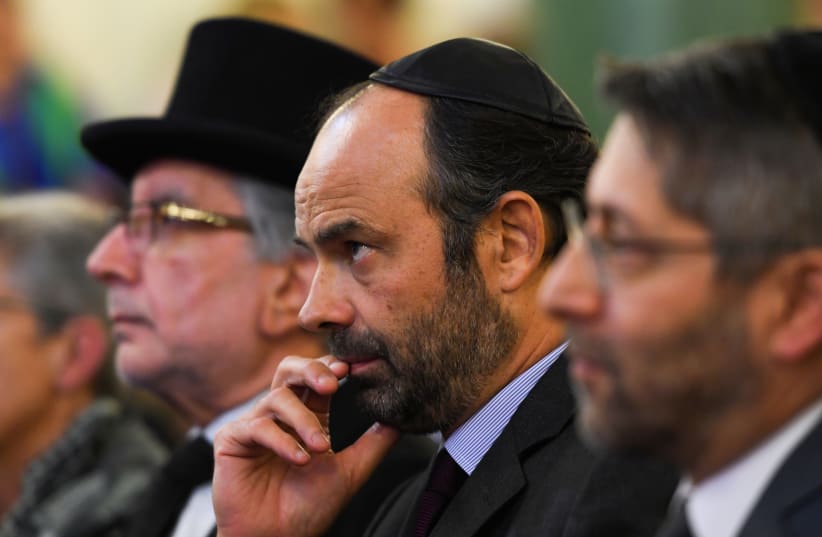On Tuesday, the eight-year-old, wearing a kippa, was assaulted by two teenagers.Earlier in January, a 15-year-old Jewish girl’s face was slashed in Paris; she was identified as Jewish by her attackers due to the school uniform she was wearing.French President Emmanuel Macron took to Twitter to denounce this week’s attack, saying: “Each time a citizen is attacked because of his age, his appearance or his religion, it is the entire republic that is attacked. And it is the entire republic that stands alongside French Jews to fight with them against each of these unjust acts.”#Sarcelles : nous ne pouvons pas accepter qu'un enfant de 8 ans soit agressé parce qu'il portait un signe religieux. C’est une agression antisémite. La justice doit passer avec sévérité. #DirectAN pic.twitter.com/IlSYkfV0Md
— Edouard Philippe (@EPhilippePM) January 31, 2018
The president and prime minister on Wednesday met with members of the Jewish community in Val D’Oise, north of Paris. Philippe confirmed that in the coming weeks the government will announce a new “interministerial plan” for the Education Ministry’s week dedicated to combating antisemitism and racism.Frederic Potier, a government delegate charged with overseeing programs to combat antisemitism and racism in France, said on French television: “It [antisemitism] did not disappear with the Vichy regime after the Second World War.”The violent attacks against French Jews, and particularly children, “are extremely grave [and] extremely dangerous for democracy,” he added.Potier credited radical Islam and conflicts in the Middle East as being sources for growing antisemitism in France.In an interview with Radio France International, Simon Wiesenthal Center director for international relations Dr. Shimon Samuels painted a bleak picture of the situation of Jews in France.“There are almost daily incidents of antisemitism, especially in the Paris suburbs where there are high-density communities of French-born youth of North African origin living cheek by jowl alongside smaller Jewish neighborhoods,” Samuels said. “Turned on by Jew-hating Internet sites, social media and radical ‘imams,’ they play out a Middle Eastern scenario of ‘Palestinians and Israelis’ transplanted to France.”Samuels charged that “once identified and arraigned, magistrates are loath to view those who have been targets of racism, now themselves become perpetrators of hate. Hence, the resistance to name these assaults as antisemitic.”He also claimed that the end of the state of emergency, which involved a significant increase in security measures for Jewish institutions, has now left the Jewish community more vulnerable to attacks.The security measures of many Jewish institutions, however, have been upgraded since the attack on the Charlie Hebdo headquarters and on the Hyper Cacher kosher grocery store in Paris in 2015, which marked the beginning of France’s Operation Sentinelle – a massive national military operation that led to the deployment of 10,000 soldiers and 4,700 police and gendarmes to protect civilians and sensitive sites as part of the state of emergency.The World Jewish Congress strongly condemned the “heinous act of aggression” against the eight-year-old boy and demanded that French authorities treat the incident with utmost severity and firm judicial and police action.“This deliberate and heinous of aggression is all the more distressing as it is clearly not an isolated incident,” said World Jewish Congress president Ronald Lauder.“France must do everything in its power to dissuade such acts from happening again. Just this month, authorities dropped terrorism charges against Hasan Diab, the criminal behind the 1980 attack on a Paris synagogue that killed four people. What kind of signal is France sending to the world in callously disregarding such crimes?”He noted that Representative Council of French Jewish Institutions president Francis Kalifat had taken immediate and determined action to secure the community and its institutions.Earlier in January, two kosher shops in Creteil, another suburb of Paris, were torched two weeks after the same shops were attacked by persons who painted swastikas on their facades.Un petit garçon de 8 ans a été agressé aujourd’hui à Sarcelles. Parce qu'il portait une kippa. À chaque fois qu’un citoyen est agressé en raison de son âge, de son apparence ou de sa confession, c’est toute la République qu’on agresse. 1/2
— Emmanuel Macron (@EmmanuelMacron) January 31, 2018
